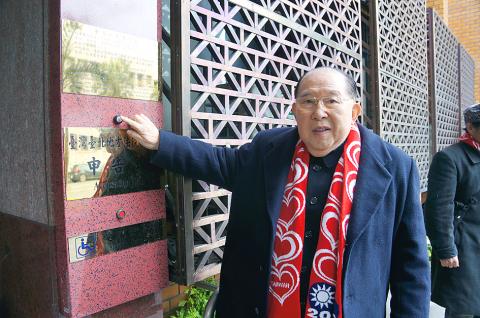George Wang (王可富), lawyer and former legal consultant to Ma Ho-ling (馬鶴凌), yesterday filed suit against 13 elite members of the Chinese Nationalist Party (KMT) — including President Ma Ying-jeou (馬英九) — accusing them of breach of trust and embezzling NT$200 billion (US$6.3 billion) worth of party assets.
“Ma Ying-jeou is behind the unexplained depreciation of party assets,” Wang said as he filed the suit with the Taipei District Prosecutors’ Office.
Ma Ho-ling, who died in 2005, was Ma Ying-jeou’s father.

Photo: Chien Li-chung, Taipei Times
Wang said he had sought meetings with Ma Ying-jeou to address the party’s lingering issues with its potentially ill-gotten assets, as well as to tackle problems associated with veterans’ pensions, but has been rejected three times.
A 56-year KMT member, Wang said that his annual membership fees were part of the party’s assets, which he said shrank from NT$200 billion in 2000 to just NT$27 billion in 2006 for unknown reasons.
He added that the KMT was wrong for appropriating public property into party assets, properties he said must be returned to the state.
Wang said that Ma Ying-jeou, KMT chairman from 2006 until early last month, and 12 other prominent figures in the KMT’s ruling body between 2000 and 2006 — including former vice president Lien Chan (連戰) — must be held responsible for the unexplained plunge in value and the damage done to members.
Wang highlighted differences among various reports of asset value, saying that former KMT treasurer Liu Tai-ying (劉泰英) once estimated holdings to be worth NT$200 billion, while New Taipei City Mayor Eric Chu’s (朱立倫) assessment was just NT$100 billion, Wang said.
Moreover, he added, the party’s own assets report — submitted to the Ministry of the Interior in 2013 — tallied a total value of just NT$26.8 billion.
“The figure showed a steep plummet from Liu’s and Chu’s estimations,” Wang said.
Saying that no party assets were returned to the state — nor used for charity — between 2000 and 2006, Wang questioned the cause of their plummeting value.
He called on the Taipei District Prosecutors’ Office to summon Liu, Chu and former president and former KMT chairman Lee Teng-hui (李登輝) for questioning to calibrate and clarify what happened to the party’s assets since Lee stepped down as chairman in 2000.
Besides Ma Ying-jeou and Lien, Wang’s suit named former KMT chairman Wu Poh-hsiung (吳伯雄) and other KMT officials, including Chiang Ping-kun (江丙坤), John Kuan (關中), Lin Feng-cheng (林豐正) and Chan Chun-po (詹春柏). KMT Vice Secretary-General Lin Te-jui (林德瑞) also made the list.
This story has been corrected since it was first published.

‘DENIAL DEFENSE’: The US would increase its military presence with uncrewed ships, and submarines, while boosting defense in the Indo-Pacific, a Pete Hegseth memo said The US is reorienting its military strategy to focus primarily on deterring a potential Chinese invasion of Taiwan, a memo signed by US Secretary of Defense Pete Hegseth showed. The memo also called on Taiwan to increase its defense spending. The document, known as the “Interim National Defense Strategic Guidance,” was distributed this month and detailed the national defense plans of US President Donald Trump’s administration, an article in the Washington Post said on Saturday. It outlines how the US can prepare for a potential war with China and defend itself from threats in the “near abroad,” including Greenland and the Panama

A wild live dugong was found in Taiwan for the first time in 88 years, after it was accidentally caught by a fisher’s net on Tuesday in Yilan County’s Fenniaolin (粉鳥林). This is the first sighting of the species in Taiwan since 1937, having already been considered “extinct” in the country and considered as “vulnerable” by the International Union for Conservation of Nature. A fisher surnamed Chen (陳) went to Fenniaolin to collect the fish in his netting, but instead caught a 3m long, 500kg dugong. The fisher released the animal back into the wild, not realizing it was an endangered species at

The High Prosecutors’ Office yesterday withdrew an appeal against the acquittal of a former bank manager 22 years after his death, marking Taiwan’s first instance of prosecutors rendering posthumous justice to a wrongfully convicted defendant. Chu Ching-en (諸慶恩) — formerly a manager at the Taipei branch of BNP Paribas — was in 1999 accused by Weng Mao-chung (翁茂鍾), then-president of Chia Her Industrial Co, of forging a request for a fixed deposit of US$10 million by I-Hwa Industrial Co, a subsidiary of Chia Her, which was used as collateral. Chu was ruled not guilty in the first trial, but was found guilty

DEADLOCK: As the commission is unable to forum a quorum to review license renewal applications, the channel operators are not at fault and can air past their license date The National Communications Commission (NCC) yesterday said that the Public Television Service (PTS) and 36 other television and radio broadcasters could continue airing, despite the commission’s inability to meet a quorum to review their license renewal applications. The licenses of PTS and the other channels are set to expire between this month and June. The National Communications Commission Organization Act (國家通訊傳播委員會組織法) stipulates that the commission must meet the mandated quorum of four to hold a valid meeting. The seven-member commission currently has only three commissioners. “We have informed the channel operators of the progress we have made in reviewing their license renewal applications, and